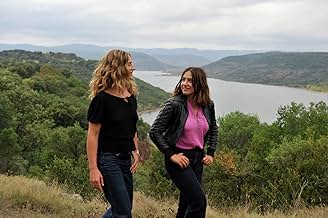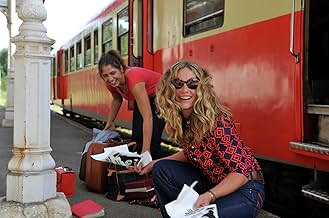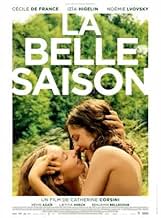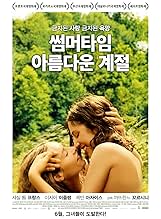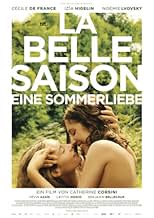La belle saison
- 2015
- Tous publics
- 1h 45m
IMDb RATING
6.7/10
6.1K
YOUR RATING
A young woman moves from the French countryside to Paris and begins a passionate love affair with a feminist leader in this drama set in 1970s France.A young woman moves from the French countryside to Paris and begins a passionate love affair with a feminist leader in this drama set in 1970s France.A young woman moves from the French countryside to Paris and begins a passionate love affair with a feminist leader in this drama set in 1970s France.
- Director
- Writers
- Stars
- Awards
- 3 wins & 8 nominations total
Cécile de France
- Carole
- (as Cécile De France)
Natalie Beder
- Marie-Laure
- (as Nathalie Beder)
- Director
- Writers
- All cast & crew
- Production, box office & more at IMDbPro
Featured reviews
Watching this film in the start of 'pride month.'
Summertime is an engaging love story in the 70's. This is a very sensitive portrayal of two women from different backgrounds in conservative, rural France. Set in the early 70s in the first flush of modern feminism, the plot is pretty simple and the issue simpler - will they stay together against the pressures of rural society? The film is very realistic as it deals with woman rights and also portrays the societal views on lesbian culture in the 70's. This is a very good representation of LGBTQ in the films.
As I was watching this film, I was very much reminded of another French film, "Blue is the Warmest Colour" which also deals with similar theme of lesbianism. I really love 'Blue is the Warmest Colour' and is my favourite romance film. However, this film is also a good film with good themes and lesbian representation. This film shows how it is to be a lesbian in a rural France in the 70's, how the society thinks of a girl involving with another girl.
Overall, it's a pretty good film which portrays a really interesting subject matter.
As I was watching this film, I was very much reminded of another French film, "Blue is the Warmest Colour" which also deals with similar theme of lesbianism. I really love 'Blue is the Warmest Colour' and is my favourite romance film. However, this film is also a good film with good themes and lesbian representation. This film shows how it is to be a lesbian in a rural France in the 70's, how the society thinks of a girl involving with another girl.
Overall, it's a pretty good film which portrays a really interesting subject matter.
I didn't much care for the first half of 'Summertime': a posse of beautiful, self-confident and middle-class young feminists assert their right to "to as they please" in the Paris of the 1970s. What is absent from the portrayal is any sense of the personal insecurity that cripples most of us; these sisters, it seems, can quite literally do anything for themselves. The film becomes more nuanced when it follows two of its protagonists (a lesbian couple) back to the farm in the country where one of them (Delphine) grew up, and whence she has now been summoned owing to the illness of her father. There's still some idealisation here: the family own their farm and live a simple peasant life. But the conflict between Delphine's familial and spatial sense of identity, and the new relationship she has forged in the city, is nicely portrayed, as is the guarded hostility of her mother and her local acquaintances to the choices she has made in her new life. Overall, it's not nearly as strong as 'Blue is the Warmest Colour', but it grew on me as I watched it.
This story of a relationship between a farmer's daughter and the woman she meets in Paris is effective in some ways. Set in the early 70s in the first flush of modern feminism, the plot is pretty simple and the issue simpler - will they stay together against the pressures of rural society? Izia Hegelin makes an effective and believable daughter of the soil, struggling to reconcile her feelings and her ties to her land and family; in an underwritten role as her lover, Cecile de France is less effective but does her best. Some good scenes showing the sometimes silly behaviour of activists and their disconnect from real life. The ending seemed slightly unlikely to me in some ways. There are sex scenes but they are neither very erotic nor graphic. So - worth seeing, but only a moderately good film.
LGBT rights are more relevant than ever. In several countries, unfortunately, the trend is towards more difficult living conditions for gays and transgender people. Seen in such a perspective, the plot of this film remains relevant, despite the fact that it depicts a summer in 1971.
Although perhaps the problem here is something we have seen in many films, the film is experienced as both engaging and well told.
I sat thinking when I saw this movie; how many such fates exist? Both before and now? That people cannot live their lives to the fullest, in fear of condemnation from their surroundings. There are probably a lot of them, and in that way such films become important and unfortunately relevant. For such films we need. We need to be reminded of how the world treats and views queer people. In addition to a strong and pointed action, the film is also beautifully filmed, well directed and with good actors who get both convincing and engaging.
An enjoyable film, with some great performances; but less travelled country roads should be rather more bumpy.
While a far from novel story, the three female leads (Izïa Higelin, Cécile de France and Noémie Lvovsky) give pitch perfect performances.
Where this film falls down is in giving the two lovers, far too smooth a ride. If you're fighting for freedom, surely the establishment would offer far more resistance? Here, the revolutionaries hardly seem to experience any push-back. There's one bump in the road, but that's really it.
While a far from novel story, the three female leads (Izïa Higelin, Cécile de France and Noémie Lvovsky) give pitch perfect performances.
Where this film falls down is in giving the two lovers, far too smooth a ride. If you're fighting for freedom, surely the establishment would offer far more resistance? Here, the revolutionaries hardly seem to experience any push-back. There's one bump in the road, but that's really it.
Did you know
- TriviaDirector Catherine Corsini stated that she named the two main characters Carole and Delphine after real life artists and feminists Carole Roussopoulos and Delphine Seyrig.
- GoofsAfter a swim in the pond, the girls lay out to take some sun. As Carole lays naked on the blanket resting her head on Delphine, her arms are raised and we can see she does not have any underarm hair. As the girls start to kiss and caress Carole's armpit is exposed again but this time full of underarm hair.
- ConnectionsReferenced in Théo et Hugo dans le même bateau (2016)
- SoundtracksL'Hymne du MLF, d'apres Le Chant des Marais
(Johann Esser/Wolfgang Langhoff/Rudi Goguel)
With the kind permission of Edition Peters Group
All rights reserved
- How long is Summertime?Powered by Alexa
Details
- Release date
- Countries of origin
- Official site
- Languages
- Also known as
- Summertime
- Filming locations
- Haute-Vienne, France(scenes in the country)
- Production companies
- See more company credits at IMDbPro
Box office
- Budget
- €4,800,000 (estimated)
- Gross US & Canada
- $35,322
- Opening weekend US & Canada
- $15,413
- Jul 24, 2016
- Gross worldwide
- $3,778,938
Contribute to this page
Suggest an edit or add missing content

![Watch Bande-annonce [OV]](https://m.media-amazon.com/images/M/MV5BMzZiZTVkNWItZGNjYS00ZDY2LWFkOGItZjhkNTk2NDQ3ZDE2XkEyXkFqcGdeQXRyYW5zY29kZS13b3JrZmxvdw@@._V1_QL75_UX500_CR0)


